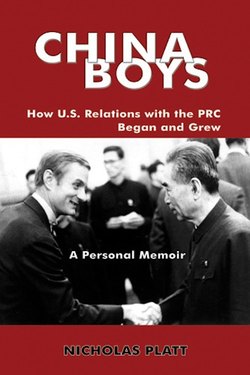Читать книгу CHINA BOYS: How U.S. Relations With the PRC Began and Grew. A Personal Memoir - Nicholas MD Platt - Страница 40
На сайте Литреса книга снята с продажи.
Sino-Soviet Hostility Changes the Game
ОглавлениеDuring my years in INR, 1969–71, the Nixon White House laid the groundwork for its opening to China. My office covered the growing alarm in Beijing over Soviet actions and attitudes, which forced a major shift in PRC strategic policy and which the president and Dr. Kissinger were quick to note and secretly exploit.
March 1969 saw the beginning of violent armed clashes between the Chinese and the Soviets along the Ussuri River that formed the boundary between the two countries. Tank battles and artillery exchanges across the frozen river marked a new stage in an ideological rivalry that had become national and personal. Bizarre photographs, like the one showing a horde of Chinese swarming over a Soviet armored personnel carrier and beating at it with sticks, demonstrated the depth of Chinese fear and, we concluded, sent a calculated message to Moscow: If you attack us, we will drown you in the sea of people’s war. The incidents spread, occurring as far west as the border between Xinjiang and Kazakhstan. The Soviet buildup in Mongolia and other areas along the frontier grew from twelve poorly equipped divisions in 1964 to forty divisions in full readiness.
The result was “an atmosphere of war panic in China,” Assistant Secretary of State for East Asian Affairs Marshall Green wrote later. “Air raid shelters were built on a massive scale. A CIA estimate of October 1969 placed the chances of a Soviet effort to knock out China’s nascent nuclear weapons factories at about 1 in 3.”6 As the State Department representative on the interagency committee that produced the intelligence estimate, I remember a lengthy debate on whether the Soviets could really perform a “nuclear castration” of China. The conclusion was no. China, as one analyst put it, had at least “eight balls,” and these were not clustered in one place.
Four broad options were under discussion within the administration as to how the United States should position itself in response to Sino-Soviet hostilities, I told a Council on Foreign Relations audience in Chicago at the end of September 1969. I spoke off the record. Stewart E. Hoyt of the Milwaukee Journal reported my talk without attribution:
1. Make it clear to the Soviet Union that Washington would do nothing to impede its confrontation with China. Proponents of this approach did not want to sabotage agreements that the United States was working on with Moscow (notably arms limitation). Opponents worried about preventing improvement of American relations with China.
2. Do the opposite—make it clear that the United States will oppose any effort to bring China to heel. Proponents said that this would speed an improvement in relations with China. Opponents said it would jeopardize relations with Russia—and the United States had more in common with Russia than with China.
3. Do nothing. This had already been ruled out.
4. Adopt a positive attitude toward both sides, while making it clear that they could not take American support or lack of support for granted.
Option 4 was chosen. Intentionally vague, it gave Washington the freest hand to influence events without being committed to one side or the other. It left both China and Russia guessing, worrying that Washington would help the other.
Many judgments went into the making of such a subtle policy, I told the Chicago audience. For one thing, American expert opinion judged that China and Russia would not go all the way to war, despite the military buildup and the whipping up of animosity for the other in each country. Yet allowance had to be made for miscalculation. Each side had made big mistakes already in handling the other, so escalation to a war that neither side wanted was conceivable.
U.S. policy makers sensitive to the balance of power believed that U.S. interests were best served when Russia and China were more evenly matched. Russia was stronger than China. Therefore the United States should consider ways of bolstering the Chinese side,
China, to be sure, might not want overt American help, because it might provoke a Russian attack. Moreover, there remained issues between the United States and China (especially Vietnam and the future of Taiwan) on which Beijing and Washington appeared irreconcilable. So help that Washington gave to strengthen Beijing’s hand had to be subtle, more to be thought of as “signals” than as a genuine relaxation of the long feud between China and the United States.7
